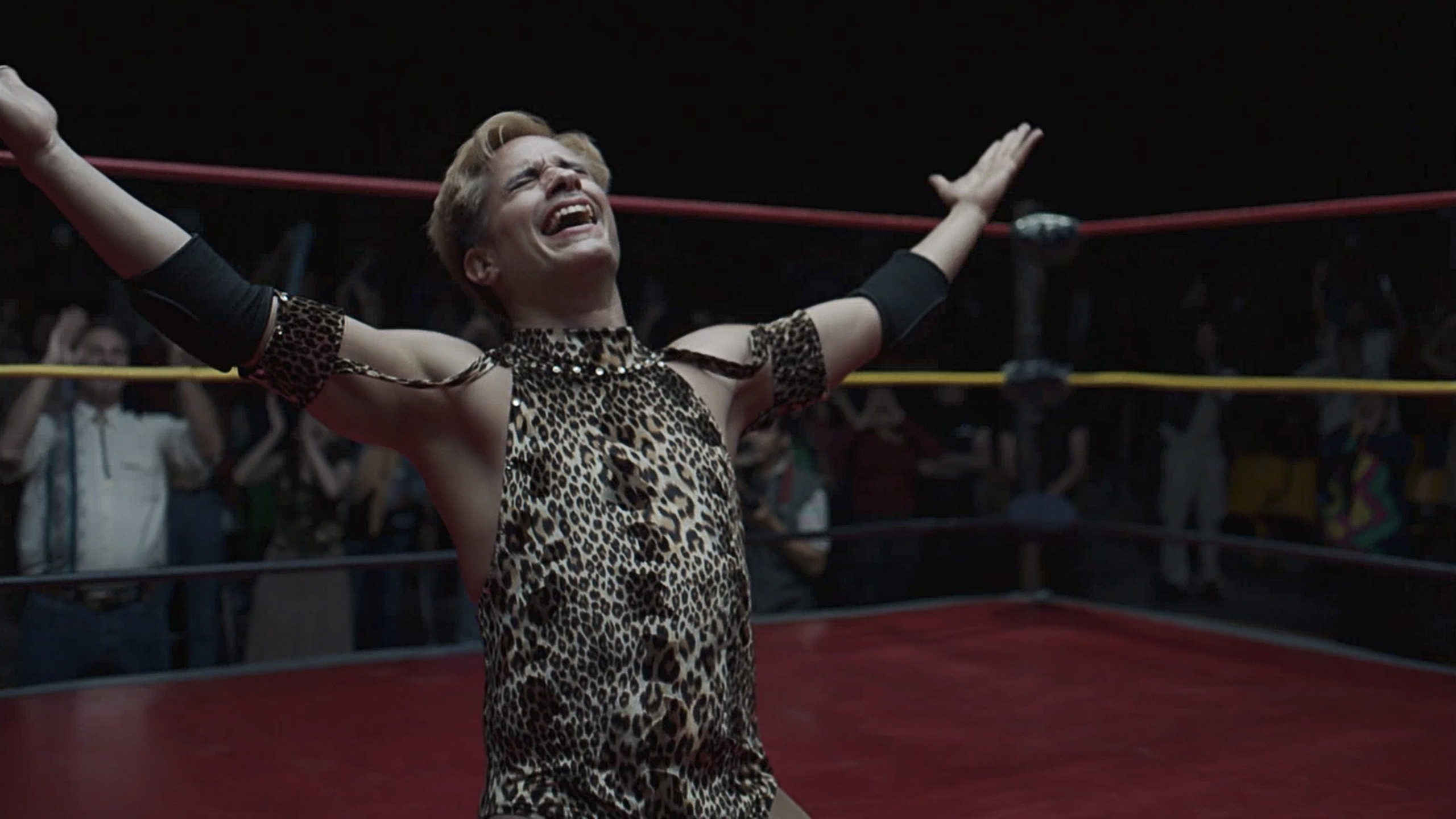Saúl (Gael Garcia Bernal) is a luchador failing to make an impact. He performs as El Topo, but his slender frame lacks the significant muscularity of his colleagues, meaning none of them take him seriously. A lifetime of passion for lucha libre doesn’t seem to have amounted to much, as Saúl is stuck fighting, and losing, in a small town.
But Saúl isn’t one to give up. He’s going to make a better life for himself and his mother (Perla de la Rosa), whom he lives with. Saúl reaches out to Sabrina (Roberta Colindrez), a trainer who also fights as a luchadora, to help him gain strength and technique to get an advantage over his opponents. It’s a stroke of inspiration that will end up changing his life forever—he decides to become an exótico, a villain of the sport, relentlessly mocked and chided for performing in drag.
Cassandro, the narrative feature debut of documentarian Roger Ross Williams, who writes and directs, charts the incredible rise of a queer wrestler in a world designed to bring him down and is a joy to behold. Based on the real-life luchador who changed the landscape of lucha libre, Williams’s film is keen to focus on the incredible effect women have had on Saúl’s life. Support networks have been an important theme of Williams’s previous work in his documentaries Life, Animated and God Loves Uganda, highlighting how these systems are essential to help those on the fringes of society thrive. In Cassandro, that support for Saúl comes from his mother and Sabrina. Biopics can fall into a trap that makes it seem like the subject is a self-made phenom, but everybody needs help along the way, and Cassandro expresses that idea with enthusiasm.
When Saúl steps into the arena as Cassandro for the first time, it’s a euphoric moment. For most, it would be terrifying: exóticos exist to be mocked and humiliated on their way to an all-but-guaranteed defeat. Cassandro struts to a Spanish-language version of “I Will Survive,” an effective metaphor for his perseverance. A chorus of boos rains down almost immediately as the spectators gleefully let this new fighter know that his femininity is not welcome in their ring. Every story needs a villain, and who is better than the lone homosexual?
But Cassandro carries himself like he’s surrounded by thunderous cheers. There’s a stark contrast between Cassandro and Saúl’s previous persona—none of the confidence was present in his previous character, but Cassandro feels like a natural extension of himself, and Saúl never seems happier than when he’s in the ring and unabashedly feminine. Being an exótico forces Saúl to put his sexuality first, as it’s immediately pronounced he enters the arena. With his queerness no longer a burden, Cassandro can focus on being a star.
Lucha libre is about performance as much as physical talent, and Cassandro has both abilities in spades. His exuberance and skills are infectious, and incredibly, his determination to win over the crowd despite the entire history of the sport playing against him actually works. Vicious chants of “faggot” and “homo” permeate the arena, but the words only make Cassandro more fiercely committed to being unapologetically himself. Thanks to his explosive and infectious charisma, those slurs bleed into something thrilling—gleeful chants of Cassandro’s name.
Sports films are often classified by their relentless masculinity and heterosexuality. Cassandro feels like an invigorating disruption to the sports movie genre, just as the real Cassandro disrupted the lucha libre scene.
Williams shows a knack for fiction, weaving a compelling and satisfying narrative. There are a few threads that feel superfluous, and sometimes the plot languishes, but the film is never more exciting than when Cassandro is in the ring. Happiness may elude Saúl in many aspects of his life, but there, there’s never any doubt that he feels completely and utterly alive.
That’s a credit to Bernal’s sensational performance, who channels the world-class exuberance of the real-life Cassandro. It’s a fearless performance of an outwardly fearless person, someone ahead of his time in every way. The world may not have been ready for Cassandro, but through showmanship and pure passion, he made them ready, and, thanks to Bernal, it never feels inauthentic. It’s impossible to not fall head over heels for him and his fiery charm, and you’ll be rooting for him every step of the way.
While Cassandro is a lively and rousing film that enjoys every moment of Saúl’s rise to the top, Williams also recognizes the great challenges of our hero’s journey. Though he’s alive in the ring, true satisfaction seems to elude Saúl. While people are surprisingly receptive of Cassandro’s queer identity, the same cannot be said of the man behind the persona. This is smartly illustrated in a bar scene where passersby comment on Saúl’s incredible success to his face, but make a mockery of his homosexuality behind his back.
Scenes with Saúl and his secret romantic partner Gerardo (Raúl Castillo) are tender and romantic, but also fraught with tension. While Saúl is openly homosexual, Gerardo is deeply closeted, with a wife and children. He has the life Saúl longs for, but can never have. That’s crucial to the success of Cassandro: equal parts triumphant and heartbreaking, much like the queer experience.


 Why you can trust Xtra
Why you can trust Xtra


